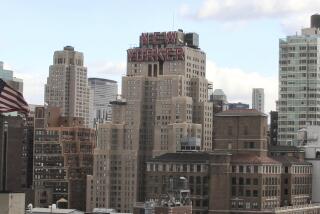Travel Horrors: New York : The Apple’s Revenge : Their anniversary weekend created memories that can’t be replaced . . . unlike their luggage
“HOLIDAY WEEKEND BARGAIN! TAKE A BITE OUT OF THE BIG APPLE FOR $125 A NIGHT.”
This offer from New York’s Marriott Marquis, mailed to our Chevy Chase home a few weeks before last Memorial Day weekend, was almost impossible for my wife, Ellen, and me to resist. That weekend coincided not only with our own 35th wedding anniversary but with the fifth anniversary of our daughter Cindy and her husband, Brooks, who live in the neighboring Maryland suburb of Silver Spring. The stage seemed set for a high-concept joint celebration.
We planned not only to enjoy our visit to New York, but to recycle the memories for years to come. And all for $125 a night, which by the standards of Manhattan, where hotel prices are as high as the skyline, seemed quite a bargain.
As it turned out, though, our trip to Gotham brought memories of the wrong kind. Right now, when we look back on our visit the recollections that come to mind are not of our visits to New York’s bright spots. Instead we tend to dwell on the looting of my wife’s purse in the hotel elevator, the burglary of our car in broad daylight on a Greenwich Village street and our subsequent trip to the dingy confines of the Ninth Precinct station house, all of which transformed our 24 hours in Manhattan from an anniversary waltz into something reminiscent of the Neil Simon play and film “The Out-of-Towners.”
Of course, we did not think of ourselves as anything like the yokels played by Jack Lemmon and Sandy Dennis in the movie. In fact, we thought of ourselves as quasi-New Yorkers. We had all lived in the city or its environs and visited there often. We knew of the perils that lurk in the asphalt jungle, but we thought we could cope with them. And we did take precautions.
To be extra secure we no sooner had arrived in midtown Manhattan on Saturday afternoon, than we invested $19.95 to stash our car safely in a garage right across 46th Street from the Marriott.
Brooks and Cindy immediately set off for the Salon de Tokyo, a massage salon near Central Park, specializing in shiatsu. Ellen and I decided just to stroll around Manhattan in the brilliant May sunshine. But heading down to the lobby, we were reminded of one of the Marriott’s shortcomings. Its Times Square location is convenient, the rooms are comfortable and the staff is friendly. But the hotel is under-elevatored. By the time the light flashes and the car arrives, it is often as crammed as the subway at rush hour, and we waited impatiently while car after car zipped past our floor. Because we were still angry about the wait, and about barely being able to breathe once we boarded, we did not notice that someone had dipped into Ellen’s purse and snatched her wallet, which contained two checkbooks, a bank card and $80 in cash.
Oblivious to Ellen’s missing valuables, we strolled leisurely down Fifth Avenue and got back to the hotel in time for a pre-dinner cocktail in The View, a 50th-floor rotating bar atop the hotel (which fortunately can be reached through a special elevator). For the price of a glass of California Chardonnay and a Miller Lite ($12 for both) most of Manhattan, from the Battery to the Triboro Bridge was stretched out at our feet.
Next we rendezvoused with Brooks and Cindy and taxied downtown to the Chelsea Central, a trendy Greenwich Village restaurant that was nearly empty. “Nobody comes downtown on Memorial Day,” our waiter told us cheerfully.
Seated in a carved oak banquette under the lofty stamped tin ceiling, we dined on soft shell crab, lobster bisque, encrusted salmon, risotto and corn cakes and linguine with portobello mushrooms all for $160, complete with drinks, two bottles of wine and tip.
To work off the splendid meal, and to enjoy the sights of Greenwich Village, we decided to hike the mile to the Lortel Theater on Christopher Street to see “Four Dogs and a Bone,” a satire about four people involved in making a motion picture. Its author, Patrick Shanley, had scripted “Moonstruck,” and the critics had hailed the “crackling wit” of his latest work.
We found it pointless and tasteless, but we all agreed that no one really minded after our great dinner.
Early next morning, when even the elevators came promptly, we grabbed a quick breakfast in the hotel coffee shop and took a cab uptown to the Whitney Museum of American Art to see the spectacular Richard Avedon photography show then on display. By now we were convinced the Big Apple was our oyster. Taking full advantage of this second successive sparkling day, we hiked back to the hotel along Fifth Avenue, scorning the taxis and horse-drawn carriages. Checking ourselves out of the Marriott, and the car out of the parking garage, we drove downtown to Greenwich Village, planning a visit to the Strand, a celebrated second-hand book store, and a late lunch before leaving town.
Hubris brought us down. Flushed with our (mostly) successes so far, we were convinced we could find New York’s rarest jewel, a parking place. Twenty minutes of searching yielded no results, but I was determined: “Let’s look a little more,” I insisted. “I feel lucky.” Then, right in front of us, a car suddenly pulled away from the curb on East 4th Street and we hustled into the spot.
Looking back, I can detect the red flags that should have warned us off. Though it was mid-afternoon, and a Tower Record store on the corner of Lafayette and Fourth was open for business, an ominous silence pervaded the street. In our prolonged search for a parking place, we had wandered too far from the hustle and bustle of the west side of the Village. And our Maryland license plates marked us as out-of-towners.
But, persuaded that our belongings were secure in the locked trunk, we set off for the Strand: tens of thousands of volumes in two sprawling levels, sensibly categorized, alphabetically stacked and guarded by clerks who actually know the stock well enough to aid in the search for a hard-to-find volume. Our book browsing and buying had stoked our appetites, so we lunched at the Second Avenue Delicatessen, a 15-minute walk away. Sated with corned beef on rye and crisp pickles, we headed back to the car.
The thieves were slick. They left not so much as a scratch on the trunk lid to betray their dirty work. Our first clue came when the trunk key would not work. I began to suspect the worst. My heart sinking, I flipped the latch under the driver’s seat to open the trunk. In my life I have never seen any space as empty.
“Maybe it’s the wrong car,” Brooks said implausibly.
“Oh my God,” said Ellen.
Gone were a half-dozen suitcases and garment bags. We quickly drove five blocks to the nearby Ninth Precinct, where--miracle of miracles--we once again found a parking place. This time we had no reason to worry about leaving the car since there was nothing left to steal but the car itself.
“There’s a lot of this stuff going on,” P. J. Williams, the administrative clerk at the precinct told us as she processed our claim. “We should probably put up signs warning people.”
While Ellen and I filled out the police claim forms, at the clerk’s suggestion we dispatched Brooks and Cindy to a nearby playground. It had been transformed into a kind of thieves market. Clothing, jewelry, radios and other valuables that had once belonged to other unfortunate visitors to (and no doubt residents of) the Big Apple were strewn on the ground to entice passersby.
But as Cindy reported when she and Brooks returned: “Our stuff was nowhere in sight.” Undoubtedly others had already found bargains for themselves in our bargain weekend.
We tallied our losses as we drove drearily back to Maryland: favorite items of clothing and jewelry that had more sentimental than monetary value, particularly a watch that I had given Ellen on our first anniversary, 34 years before.
On the morning after we returned, we had reason to feel even worse. Looking through her purse, Ellen finally discovered that her wallet had been ripped off too.
Sure we bashed New York. But with the passing of time we have had the chance to think more about our bargain that backfired and put it in some perspective.
Most important, no one was hurt. Also, nearly everything we lost could be replaced, at least in a material sense. Under our insurance coverage we collected about 80 cents on every dollar we claimed. Also, the hotel returned Ellen’s checkbooks and bank card, which the thief had apparently dumped soon after he left the elevator with her $80.
Nevertheless, we are not ready to give up on our erstwhile hometown, the Big Apple, on its restaurants, its museums, its theaters (even when the satire falls flat), and its hotels (even when the elevators don’t run on time). But are we going to be more vigilant? You bet.
And not just in New York. The month after our anniversary trip the four of us drove down to Kitty Hawk, N.C., for our annual summer escape to the beaches of the Outer Banks. Crime on the Outer Banks either goes unreported or uncommitted. But this summer, for the first time in the more than 20 years that we have vacationed there, when we left our oceanfront cottage to sit on the beach less than 100 feet away, we locked all the doors and took the key with us.
*
Shogan is a political writer in The Times’ Washington bureau.
More to Read
Sign up for The Wild
We’ll help you find the best places to hike, bike and run, as well as the perfect silent spots for meditation and yoga.
You may occasionally receive promotional content from the Los Angeles Times.






